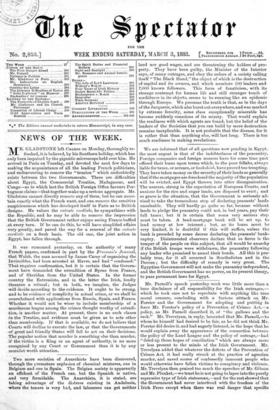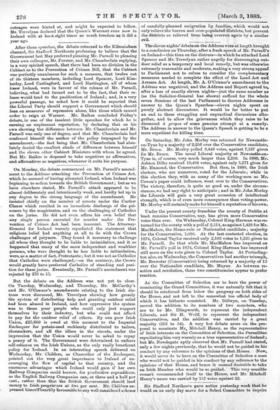Mr. Parnell ' s speech yesterday week was little more than a
bare disclaimer of all responsibility for the Irish outrages,— which he took care not to reprobate with anything like true moral censure, concluding with a furious atttack on Mr. Forster and the Government for adopting and putting in force Mr. Forster's policy of a Prevention of Crimes Act,—a policy, as Mr. Parnell described it, of "the gallows and the rack." Mr. Trevelyan, in reply, lamented that Mr. Parnell,—to whom he himself had desired to be fair, as he did not think Mr. Forster did desire it, and had eagerly listened, in the hope that he would explain away the appearance of the connection between the policy of the Land League and the policy of outrage,—had "dried up those hopes of conciliation" which are always more or less present to the minds of the Irish Government. Mr. Trevelyan added that whatever the defects of the Prevention of Crimes Act, it had really struck at the practice of agrarian murder, and saved scores of confessedly innocent people who would otherwise have fallen victims to conspiracy and violence. Mr. Trevelyan then praised too much the speeches of Mr. Gibson and Mr. Plunket,—we trust he is not going to lapse into the purely repressive type of Irish statesman,—and for the rest showed that the Government had never interfered with the freedom of the Irish Press except when there was real danger that specific
outrages were hinted at, and might be expected to follow. Mr. Trevelyan declared that the Queen's Warrant runs now in Ireland with at least eight times as much freedom as it did a year ago.



































